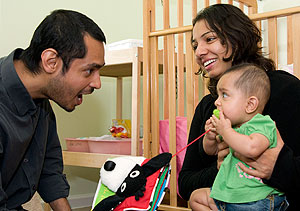Students living in the Wayman Crow, Brookings and Liggett/Koenig residential colleges in the South 40 may notice a few “more mature” fellow residents this year.
Asad Q. Ahmed, Ph.D., assistant professor of Arabic and Islamic studies; Ian MacMullen, Ph.D., assistant professor of political science; and Andrew Rehfeld, Ph.D., associate professor of political science, all in Arts & Sciences, have moved into apartments in the residential colleges as part of the faculty fellows program.

All three are excited to be living and learning members of the South 40 community.
“The faculty fellows program offers a unique opportunity to the faculty of Washington University to share their academic and cultural interests with students outside of the classroom,” said Ahmed, who lives in Wayman Crow with his wife, Asma Kazmi, and six-month-old daughter, Marjaan al-Qadri.
“My family and I are happy to participate in this very worthy endeavor on behalf of the University. We also wished to benefit from being part of such a vibrant community of bright, young men and women who have so much to teach us not just about being academics but also being productive and responsible members of the community,” he said.
The goal of the faculty fellows program, started in 1998, is to help integrate academic and residential life by having professors live in the residential colleges with students for three-year stints.
The program emerged in response to the realization that there was a growing gap between faculty members and undergraduate students on college campuses. In addition, many faculty members wished to extend their interaction with students outside the academic realm.
“This program continues to evolve in ways that we couldn’t have envisioned when it started 10 years ago,” said Jill Stratton, associate dean of students for faculty programs and academic initiatives. “Each new faculty fellow and their family bring such amazing new contributions and programs that help our students connect to each other and to their professors in unique and positive ways.”
In all, there are five faculty fellows. Joining Ahmed, MacMullen and Rehfeld are Tili Boon Cuille, Ph.D., associate professor of French in the Department of Romance Languages & Literatures in Arts & Sciences, who lives at William Greenleaf Eliot residential college; and Joseph Thompson, Ph.D., assistant professor of English and of African and African American studies, both in Arts & Sciences, who lives in Park/Mudd.
MacMullen said he and his wife, Lola Fayanju. M.D., resident physician in general surgery at the School of Medicine, joined the program because “we both really enjoy getting to know students as people, not just paper-writers.”
“My three years as a non-resident faculty associate taught me that there is a contagious energy and enthusiasm about residential life at the University; it’s fun and inspiring to be a part of it,” MacMullen said.
He said that while the program helps students see the human face of the faculty and dispel the sense of distance and intimidation, faculty members also benefit from a deeper and broader understanding of students and the undergraduate educational experience at the University.
Rehfeld, who lives with his wife, Miggie Greenberg, and his daughter, Emma, 14, and son, Hoben, 13, in Liggett/Koenig residential college, was interested in getting to know his students outside of the classroom.
“Teaching students gives me a rather narrow view of their lives and interests, what’s of concern to them,” he said. “This position is an excellent way to bridge the gap between simply professor/student and open up a space in which a mutual appreciation of each other can enhance our lives.”
All three professors plan programming for students in their residential colleges.
Ahmed and his wife, a sculptor, plan to host three young St. Louis artists to share their work, sponsor a sculpture event and take trips to area art openings. They will also be showing an independent Iranian film followed by an informational discussion by a leading scholar.
The couple also will open their doors to the Wayman Crow residents once a month for coffee, cookies and conversation.
MacMullen and his wife will be hosting a weekly current affairs discussion group over dinner in their apartment and a series of foreign film nights. “I’m also hoping to dust off my cello and play some chamber music with Brookings residents,” he said.
Rehfeld is planning trips to presidential libraries in Springfield, Ill.; Independence, Mo.; and Little Rock, Ark. He also hopes to sponsor a “curry night” of Indian cuisine, dinner on the first night of Rosh Hashana and groups of students to watch the vice presidential debate.
Though they’ve only been living on the South 40 since late this summer, all three are enjoying the experience.
“I have been struck by two early comments by students,” Rehfeld said. “The first is that many of them tell me how ‘cool’ they think it is that we are living there,” he said.
“The other is an expression of appreciation as in, ‘I’m really grateful that you’ve made the sacrifice to live with us.’ Little do they know, we don’t really see it as a sacrifice at all,” he said.